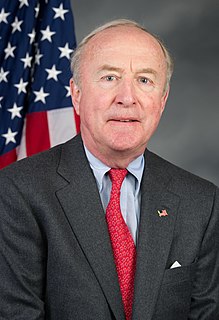A Quote by Noam Chomsky
By curious accident of history and geography, the world's major energy resources are located pretty much in Shiite regions. They're a minority in the Middle East, but they happen to be where the oil is, right around the northern part of the Gulf.
Related Quotes
By accident of geography, the world's major oil resources are in Shi'ite-dominated areas. Iran's oil is concentrated right near the gulf, which happens to be an Arab area, not Persian. Khuzestan is Arab, has been loyal to Iran, fought with Iran not Iraq during the Iran-Iraq war. This is a potential source of dissension. I would be amazed if there isn't an attempt going on to stir up secessionist elements in Khuzestan.
China is the center of the Asian energy security grid, which includes the Central Asian states and Russia. India is also hovering around the edge, South Korea is involved, and Iran is an associate member of some kind. If the Middle East oil resources around the Gulf, which are the main ones in the world, if they link up to the Asian grid, the United States is really a second-rate power. A lot is at stake in not withdrawing from Iraq.
The Iranian issue I don't think has much to do with nuclear weapons frankly. Nobody is saying Iran should have nuclear weapons nor should anybody else. But the point in the Middle East, as distinct from North Korea, is that this is center of the world's energy resources. Originally the British and secondarily the French had dominated it, but after the Second World War, it's been a U.S. preserve. That's been an axiom of U.S. foreign policy, that it must control Middle East energy resources.
Oil remains fundamentally a government business. While many regions of the world offer great oil opportunities, the Middle East with two-thirds of the world's oil and the lowest cost, is still where the prize ultimately lies, even though companies are anxious for greater access there, progress continues to be slow.
I have no problem with a war for oil-if we accompany it with a real program for energy conservation. But when we tell the world we couldn't care less about climate change, that we feel entitled to drive whatever big cars we feel like, that we feel entitled to consume however much oil we like, the message we send is that a war for oil in the gulf is not a war to protect the world's right to economic survival-but our right to indulge. Now that will be seen as immoral.
I think the public is very reluctant to get involved in more foreign wars, especially in the Middle East. And they understand, implicitly, that we go to war in the Middle East because of oil. And if we don't want to go to war in the Middle East, then we have to do something about the oil problem. And I think that view is gaining ground in the U.S.
Iraq has the second largest oil reserves in the world, it is right in the midst of the major energy reserves in the world. Its been a primary goal of US policy since World War II to control what the State Department called "a stupendous source of strategic power" and one of the greatest material prizes in history.
We know that things like energy independence, getting off oil, getting out of the Middle East, and creating jobs and economic development in the new clean energy industries of the future are much higher priorities for most voters than capping carbon emissions or taxing dirty energy sources. So why not redefine our agenda as the solution to those problems?


































